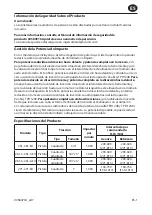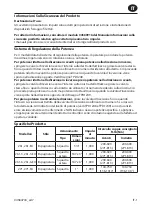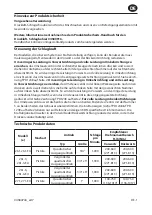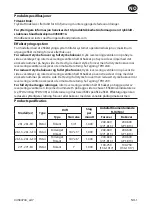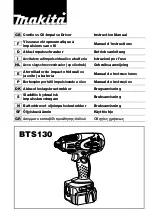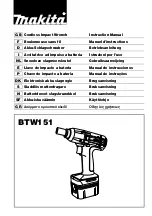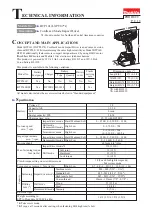
EN-2
04584744_ed7
EN
Model
Sound Level dB(A)
(ISO15744)
Vibration (m/s²)
(ISO28927)
† Pressure (L
p
) ‡ Power (L
w
)
Level
*K
261, 261-EU
98.1
109.1
10.4
1.3
261-3, 261-3-EU
98.1
109.1
10.4
1.3
261-6, 261-6-EU
98.1
109.1
10.4
1.3
271, 271-EU
98.1
109.1
13.2
1.1
† K
pA
= 3dB measurement uncertainty
‡ K
wA
= 3dB measurement uncertainty
*K= Vibration measurement uncertainty
WARNING
Sound and vibration values were measured in compliance with internationally recognized
test standards. The exposure to the user in a specific tool application may vary from these
results. Therefore, on site measurements should be used to determine the hazard level in
that specific application.
Installation and Lubrication
Size air supply line to ensure tool’s maximum operating pressure (PMAX) at tool inlet. Drain
condensate from valve(s) at low point(s) of piping, air filter and compressor tank daily. Install
a properly sized Safety Air Fuse upstream of hose and use an anti-whip device across any
hose coupling without internal shut-off, to prevent hose whipping if a hose fails or coupling
disconnects. See drawing 47132600 and table on page 2. Maintenance frequency is shown in a
circular arrow and defined as h=hours, d=days, and m=months of actual use. Items identified as:
1. Air filter
7.
Coupling
2. Regulator
8.
Safety Air Fuse
3. Lubricator
9.
Oil
4. Emergency shut-off valve
10. Grease - during assembly
5. Hose diameter
11. Grease - through fitting
6. Thread size
Parts and Maintenance
When the life of the tool has expired, it is recommended that the tool be disassembled,
degreased and parts be separated by material so that they can be recycled.
Original instructions are in English. Other languages are a translation of the original instructions.
Tool repair and maintenance should only be carried out by an authorized Service Center.
Refer all communications to the nearest
Ingersoll Rand
Office or Distributor.





